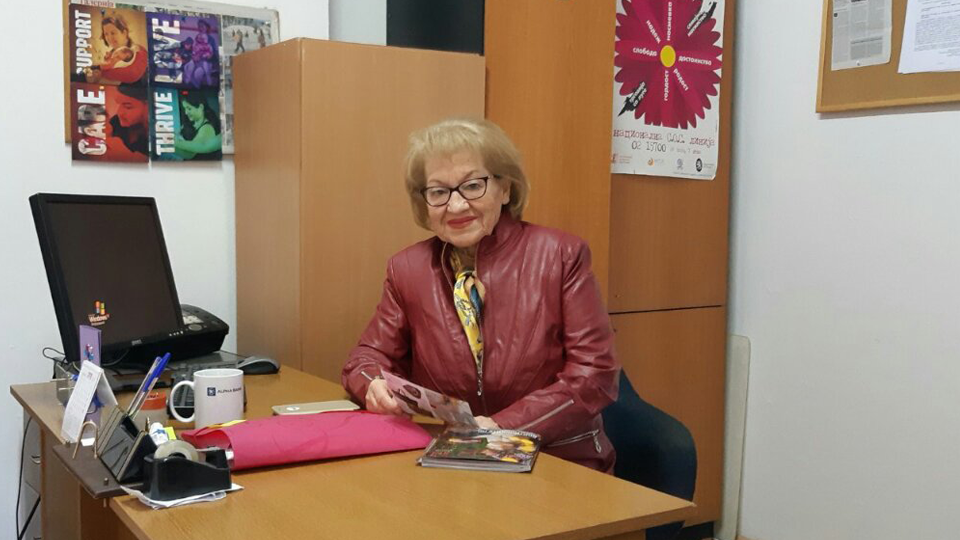Take Five: “Resources to protect survivors must remain available, be adopted or expand during the crisis”
Date:

Tomka Dlevska is a long-time women’s rights activist and the President of the NGO Organization of Women of the City of Skopje, in North Macedonia. She was among the about 30,000 activists that streamed to Beijing in 1995 for the Fourth World Conference on Women. The organization runs an SOS helpline for survivors of gender-based violence, and provides assistance, psychosocial support and shelter. Dlevska reports about a 7 per cent increase in the number of calls to her organization’s helpline during the coronavirus pandemic.
How is the COVID-19 crisis affecting victims of gender-based violence?
Our organization and the national SOS hotline continue to function 24/7. The number of calls increases day-to-day. Women usually ask for help and psychological support and some seek shelter. Since making phone calls might be dangerous during home confinement, helplines are providing online chats and texting services for victims. As per our latest records, most callers say that their abusers are using COVID-19 measures to further isolate them from family and friends. Domestic violence cases increase in times of chronic stress, disruption and pandemics, often becoming a real nightmare for female victims of gender-based violence.
What are the biggest risks for women during the lockdown?
While the coronavirus is a threat to global public health, it is important to realize that for women and girls, the threat is multiplied, as [quarantines] further expose women and girls to gender based-violence – notably domestic and sexual violence, including intimate partner violence. Rates of domestic violence will increase, globally and in North Macedonia, as our statistics already show. An increase in levels of loneliness, depression, harmful alcohol and drug use, and even suicidal behaviour, can be considered risks. To make matters worse, restrictions on movement, financial constraints and generalized uncertainty embolden and provide perpetrators with additional power and control. It is important not to leave behind women and children victims of domestic violence, as this could lead to femicides.
What can be done to overcome these risks?
Risks are aggravated when there are no, or fewer, shelters and services available for victims, when it is difficult to access those that are still open, when there is less community support and fewer police interventions, and less access to justice (as many courts are closed). I am particularly concerned about women at a higher risk, such as women with disabilities, undocumented migrant women and victims of trafficking. In this respect, not only NGOs but governments should propose new solutions to create effective, equitable policies and interventions to support them.
As this major health crisis shifts resources to the health system, how important is it that services to prevent and respond to violence adapt to the new circumstances?
Most resources will go to health systems, which are overloaded, making it harder for victims to access medical care and therapists. Many social services for victims will suffer budget cuts. Women already have difficulty accessing financial support. Therefore, resources to protect victims must remain available, be adopted or expand during the crisis. This includes ensuring access to protection, through restraining orders and maintaining safe shelters and helplines. Meanwhile, organizations working on combating gender-based violence and SOS helplines should start developing new strategies to support victims under lockdown.
I encourage women and girls not to hesitate to call our national helpline. We can provide information about all the institutions that protect women and girls, legal advice and psychosocial support. We can also help with the police and other interventions that women callers need. But the most effective message at this time, for all of us, is to stay calm and respect the new government measures.
As a senior citizen, how has the pandemic had an impact on your life in these challenging times?
I no longer have a chance to see my children, grandchildren, relatives and friends. I also miss my team, working in our office and our discussions about what to do next, how to help survivors and make their lives better. Speaking as a senior citizen, I emphasize the importance of staying connected through calls and video chats and being mindful of the unique mental health needs of those we care for. I only hope this will not last long and we will continue to function together as before. But nothing will be the same after the pandemic.